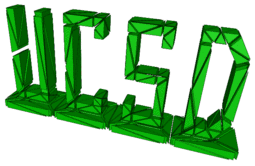|
|
Math 273B (Advanced Techniques in Computational Mathematics)
Course Topics: Computational Nonlinear PDE and Multiscale Modeling
Instructor: Prof. Michael Holst
(5739 AP&M, mholst@math.ucsd.edu)
Term: Winter 2013
Lecture: 1:00p-1:50p MWF, APM 2402
Class webpage:
http://ccom.ucsd.edu/~mholst/teaching/ucsd/273b_w13
Textbook(s):
I. Stakgold and M. Holst,
Green's Functions and Boundary Value Problems.
John Wiley & Sons, New York, NY, Third Edition, 877 pages, 2011.
CATALOG DESCRIPTION:
273B. ADVANCED TECHNIQUES IN COMPUTATIONAL MATHEMATICS (4)
Brief review of tools from nonlinear functional analysis for numerical
treatment of nonlinear PDE.
Numerical continuation methods, pseudo-arclength continuation, gradient flow
techniques, and other advanced techniques in computational nonlinear PDE.
Project-oriented; projects designed around problems of current interest
in science, mathematics, and engineering.
Prerequisites: consent of instructor.
GRADES, HOMEWORKS, EXAMS, AND IMPORTANT DATES:
Your grade in the course is based on your project and your
20-minute project presentation during the time of the final.
- Final Exam/Project Time/Place: Tue 3/19/2013, 11:30a-2:29p, 2402 AP&M
(NOTE: Moved up from Fri 3/22/2013; We may have to use a different room than 2402.)
SCHEDULE OF LECTURES:
We will cover the four major topics listed below.
The first topic will be briefly reviewed the first week, with some
of the sub-topics inserted throughout the quarter when it makes sense.
The other three major topics will each take about three weeks of the quarter.
The individual sub-topics listed within each of the major topics will
be covered in varying degree, depending on the available lecture time.
- Linear Analysis:
Banach and Hilbert spaces.
Linear operators, adjoints, four fundamental subspaces.
Operator norms.
Bounded, unbounded, closed, compact, projection operators.
Fredholm alternative.
Semi-groups.
Linear functionals, dual space, reflexive and separable spaces.
Strong, weak, weak-* topologies.
Riesz, Hahn-Banach, Banach-Schauder, and Banach-Steinhaus Theorems.
- Elliptic and Parabolic Partial Differential Equations:
Dirichlet and Neumann problems for elliptic and parabolic equations.
Classical, strong, weak solutions.
Distributions and fundamental solutions.
Definition of Sobolev spaces.
Ellipticity, inf-sup conditions, energy estimates,
Lax-Milgram Theorem, existence, uniqueness.
Maximum principles, a priori L-infinity estimates,
Harnack inequality.
Petrov-Galerkin methods,
discrete inf-sup conditions,
Babuska-Brezzi-Ladyzenskaya Theorem,
a priori energy error estimates for abstract linear problems,
applications to linear PDE.
- Nonlinear Analysis:
Nonlinear maps in Banach spaces,
variations, Gateaux and Frechet derivatives.
Taylor expansion, Newton's Method.
Inverse and Implicit Function Theorems, Bifurcation.
Stationarity of functionals.
Weakly closed sets, weak-lower-semi-continuity,
reflexive Banach spaces, weak convergence.
Existence of minimizers.
Best approximation in Banach spaces,
a priori energy error estimates for abstract nonlinear problems,
applications to nonlinear PDE.
- Fixed-Point Techniques:
Fixed-point iteration, rates of convergence.
Banach Fixed-Point Theorem.
Ordered Banach spaces, maximum principle,
monotone increasing maps.
Method of sub- and super-solutions, compatible barriers.
Extension of the Brouwer Theorem to the Schauder Fixed-Point Theorem.
Basic techniques of bifurcation theory,
homotopy methods, and numerical continuation methods.
Applications to nonlinear PDE.
|
